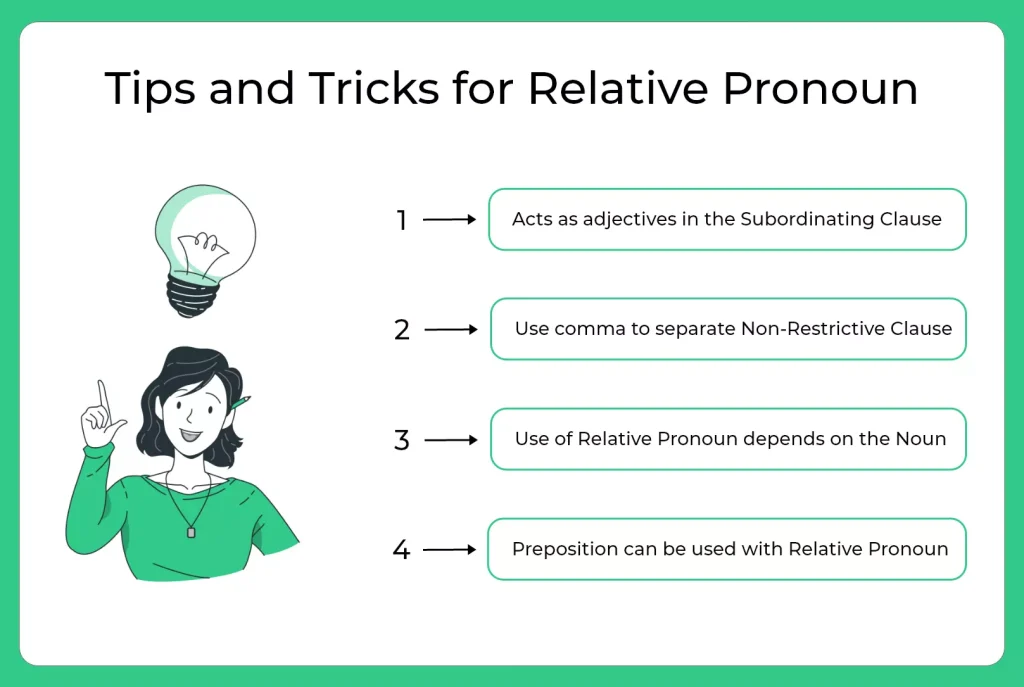Verbal Menu
- Basic Grammar
- Speech and Voices
- Tenses
- Articles
- Tenses and Articles
- Idioms and Phrases
- Subject Verb Agreement
- Prepositions and Conjunction
- Selecting Words
- Relative Pronoun
- Sentence Completion
- Sentence Ordering
- Contextual Vocabulary
- Jumbled Sentence
- Sentence Formation
- Error Identification
- Sentence Improvement and Construction
- Cloze Test
- Fill in the blanks
- Paragraph Ordering
- Para Jumbles
- Synonyms and Antonyms
- Synonyms
- Antonyms
- Reading Comprehension
- Get Off-campus Drive Updates
- Get Hiring Updates
- Contact US
PREPINSTA PRIME
Tips and Tricks and Shortcuts for Relative Pronoun
Tips and Tricks and Shortcuts For Relative Pronoun
The Tips and Tricks and Shortcuts for Relative Pronoun are easy for anyone who understands the rules for Relative Pronoun. Once you know how to use them then you can easily apply the tips and tricks and answer questions based on relative pronoun.
A Relative Pronoun question can range from a regular fill in the blank to error identification and sentence improvement as well. So you need to have a good knowledge of relative pronoun to score high in grammar.

Tips and Tricks for Relative Pronoun
The basic understanding of Tips and Tricks for Relative Pronoun is the types of Relative Pronoun and their usage. So let’s see the types first and then we’ll head towards the tips.
- Who
- Whom
- That
- Which
- What
- Whose
- When
- Where
Out of all these relative pronouns, where and when are occasionally used as relative pronoun.
Here are some example sentences from each of these relative pronouns.
- He is the boy who helped me with the mathematics equation
- Preeti is the girl with whom I had participated in the cooking competition
- She bought me the book that I had always wanted to read
- The novel, which is kept on the table, is written by Dan Brown
- I seldom understand what you try to explain to me
- I do not know when I will get back from work
- Do you know where she works for the weekend?

Relative Pronoun - Tips and Tricks and Shortcuts
Tip 1:
Relative Pronouns act as adjectives in the subordinating clause describing the main noun
The woman who stole my purse was never found again
The book that has been read by the wise always gives motivation
The the two sentence, the relative pronoun points to the noun that is the main subject. (who) points to the noun (woman) and (that) points to the noun (book).
The adjectives here are:
- Never found again – describes that the main subject was missing.
- Read by the wise – describe the book which is read by wise people
Tip 2:
We use comma to separate non-restrictive clause with the main cause. Do not use comma with a restrictive clause.
A restrictive clause is one that adds meaning to a sentence and hence cannot be omitted. In such a case, do not use comma with a restrictive clause.
For Example:
To study for the examination, the students need theory books that are written by eminent philosophers.
A non-restrictive clause on the other hand does add meaning to a sentence but this meaning or information is not very important. This clause can be removed from the sentence and will still make no difference. Such a clause is set off with a comma.
For Example:
To study for the examination, the students need elaborate theory books, which are written by eminent philosophers, a month prior.
Tip 3:
Choosing what type of relative pronoun will go in a sentence depends upon what type noun it is referring to.
Here are some rules for relative pronoun:
- Use that for restrictive cause and which for non-restrictive clause
- Use ‘which’ only for objects, ‘who’ for people and ‘that’ for both things and people (only to refer to a group or class collectively)
- The teachers couldn’t believe that a student who would always fail in English has topped in the final examinations
- The family that eat together, stays together.
- We use ‘who’ to refer to the subjects while ‘whom’ is used of objects of the verb in a sentence.
- I am bringing flower for the boy whom I love
- The boy who I love is bringing flowers for me
Tip 4:
Using Preposition with Relative Pronoun
We use a preposition at the beginning of a clause or in the end with a relative pronoun – who(m), that, which.
For Example:
In the beginning of the clause:
- I have a friend in the neighborhood, from who(m) I can borrow the notebooks
- He bought a new racket, with which he plays badminton.
At the end of the clause:
- I have a friend in the neighborhood, who(m) I can borrow the notebooks from.
- He bought a new racket, which he plays badminton with.
However, we use a preposition only at the end of the clause when we use ‘that’.
- I didn’t know I had a friend that I could borrow the notebooks from
- He couldn’t find the racket that he plays badminton with
Tricks to Learn Relative Pronouns Easily
- Use “who” for people (subject)
The teacher who teaches math is strict. - Use “whom” for people (object)
The girl whom you met is my cousin. - Use “whose” to show possession
The boy whose bike was stolen is upset. - Use “which” for animals and things
The book which you gave me is useful. - Use “that” for both people and things (essential clauses)
The car that broke down was new.
Prime Course Trailer
Related Banners
Get PrepInsta Prime & get Access to all 200+ courses offered by PrepInsta in One Subscription
Also Check Out
Relative Pronoun Shortcuts to Remember
- Who = He/She | Whom = Him/Her
(Tip: If you can replace it with “he/she,” use who; if “him/her,” use whom) - Restrictive Clause → Use “that”
(No commas: “The pen that writes smoothly is mine.”) - Non-restrictive Clause → Use “which”
(With commas: “The pen, which writes smoothly, is mine.”) - Use “whose” for both people and things (formally correct)
“The company whose profits rose is expanding.”
Common Mistakes Students Make with Relative Pronouns
- Using “which” for people instead of “who”
- Repeating the object after the relative pronoun (e.g., “whom I met him”)
- Using “who” when “whom” is needed as the object
- Leaving out the relative pronoun completely
- Using “whose” for things in formal writing
Practice Tricks to Perfect Relative Pronouns
- Identify if the noun is a person or thing.
- Check if it’s the subject or object in the clause.
- Use “that” only for essential information (no commas).
- Don’t use “which” for people.
- Reread the sentence by replacing the pronoun to test accuracy.
Also Check:
- Basic Grammar – Questions | Rules | How to Solve Quickly | Tricks & Shortcuts
- Speech and Voices – Questions | Rules | How to Solve Quickly | Tricks & Shortcuts
- Tenses – Questions | Rules | How to Solve Quickly | Tricks & Shortcuts
- Tenses and Articles – Questions | Rules | How to Solve Quickly | Tricks & Shortcuts
- Idioms and Phrases – Questions | Rules | How to Solve Quickly | Tricks & Shortcuts
- Subject Verb Agreement – Questions | Rules | How to Solve Quickly | Tricks & Shortcuts
- Prepositions and Conjunction – Questions | Rules | How to Solve Quickly | Tricks & Shortcuts
- Selecting Words – Questions | Rules | How to Solve Quickly | Tricks & Shortcuts
- Relative Pronoun – Questions | Rules | How to Solve Quickly | Tricks & Shortcuts
- Sentence Completion- Questions | Rules | How to Solve Quickly | Tricks & Shortcuts
- Basic Grammar
Questions
Rules
How to Solve Quickly
Tricks & Shortcuts - Speech and Voices
Questions
Rules
How to Solve Quickly
Tricks & Shortcuts - Tenses
Questions
Rules
How to Solve Quickly
Tricks & Shortcuts - Tenses and Articles
Questions
Rules
How to Solve Quickly
Tricks & Shortcuts - Idioms and Phrases
Questions
Rules
How to Solve Quickly
Tricks & Shortcuts - Subject Verb Agreement
Questions
Rules
How to Solve Quickly
Tricks & Shortcuts - Prepositions and Conjunction
Questions
Rules
How to Solve Quickly
Tricks & Shortcuts - Selecting Words
Questions
Rules
How to Solve Quickly
Tricks & Shortcuts - Relative Pronoun
Questions
Rules
How to Solve Quickly
Tricks & Shortcuts - Sentence Completion
Questions
Rules
How to Solve Quickly
Tricks & Shortcuts
Get over 200+ course One Subscription
Courses like AI/ML, Cloud Computing, Ethical Hacking, C, C++, Java, Python, DSA (All Languages), Competitive Coding (All Languages), TCS, Infosys, Wipro, Amazon, DBMS, SQL and others

 Apply For Jobs
Apply For Jobs Get Hiring Updates
Get Hiring Updates




Login/Signup to comment